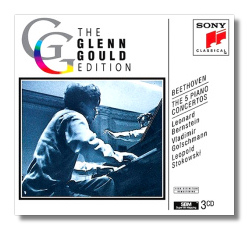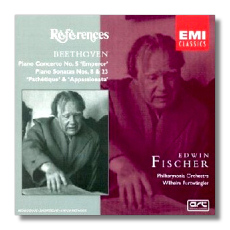
The Internet's Premier Classical Music Source
Related Links
- Beethoven Reviews
- Latest Reviews
- More Reviews
-
By Composer
-
Collections
DVD & Blu-ray
Books
Concert Reviews
Articles/Interviews
Software
Audio
Search Amazon
Recommended Links
Site News
 CD Review
CD Review
Ludwig van Beethoven

- Piano Concerto #1
- Piano Concerto #2
- Piano Concerto #3
- Piano Concerto #4
- Piano Concerto #5 "Emperor"
Glenn Gould, piano
American Symphony Orchestra/Leopold Stokowski
Sony 52632 3CDs


- Piano Concerto #5 "Emperor"
- Piano Sonata #8 "Pathétique"
- Piano Sonata #23 "Appassionata"
Edwin Fischer, piano
Philharmonia Orchestra/Wilhelm Furtwängler
EMI Classics Références 74800
Once you become aware of something nothing is the same again. Einstein said something like that.
Okay, this was another research project of mine. From time-to-time I get an itch to revisit a piece of music. In this case it came from reading ratings of the Fischer/Furtwängler recordings in both the Penguin Guide to Compact Discs who said it was one of the "classics of the gramophone" and in Alexander Morin's The Essential Listening Guide to Classical Music he said it was 'sublime". So, being a Furtwängler 'fan' I got a copy. That was not enough, however, I also decided to specifically include an examination of the Gould/Stokowski recording.
To prepare myself I read the commentaries by Bookspan and Steinberg. I sat down and listened to Kempff. His DG recording was one of the first in my collection and I have always felt it was one of the most poetic, light, almost chamber-like. Then I turned to Kovacevich on Philips with Davis and the LSO. This is an excellent recording as well with a larger heft to the music. I did all of this because I knew I was in for some different music making and wanted to have more mainstream references.
In his tome, Morin referred to Gould's recordings, especially of the "Emperor" as "perverse". I also should relate a story from Abram Chasins' biography of Stokowski. He talked about a meeting in Stokowski's apartment shortly after the recording was released and the Maestro asked for the author's opinion. Chasins replied that it seemed like the orchestra and soloist needed more rehearsal time so that they could work together better and asked if Stokowski agreed with that assessment. Stokowski simply said, "Yes." I have to admit that there are times when I get the feeling that Stokowski is conducting for a somewhat different performance than Gould has in mind but that is really a minor quibble. The overall effect is greater than the sum of the parts.
Don't listen to Gould's recording immediately after a more "normal" performance. His handling of the arpeggios in particular will likely drive you nuts. He is not so much slower as taking his time to explore the music, extract from it nuances that are not normally noticed. This is not, however, a situation where the music is more Gould than Beethoven. Rather the pianist is revealing aspects of the music that is in the notes but other performers apparently haven't considered. This is appropriate given Stokowski's dictum that 'music is more than black marks on white paper'. As you have probably guessed, I found the experience ear opening.
You cannot really say that you know this music unless you have heard Gould and Stokowski. Steinberg refers to the arpeggios at the opening of this concerto as 'cadenza-like'. If you read about cadenzas you learn that they are where the soloist shows off and in many cases soloists have written their own cadenzas (such as Milstein in Brahms and Kennedy in… ) The "Emperor" has no cadenzas so far as I can tell. So, let us consider Gould's approach to the arpeggios as cadenzas and then it becomes a perfectly legitimate and valid interpretation.
Looking over my scribbles as I listened to Gould the words "neat" "wow" and "yes!" appear. What he does, more than any other pianist I have heard, is make you aware of just how the arpeggios are central to the music, especially the first movement. His playing of them coaxes music in a fluid way that reminds me of the flow of water around my ankles when I wade in a stream. I now appreciate not only those moments, but all of the piano playing throughout the whole concerto.
Okay, now for the orchestral accompaniment. As pointed out in Chasins' anecdote, Stokowski does not seem as if he and Gould had worked this out as well as they could have, at least in the first movement. The orchestral playing doesn't have the tension I would have expected from Stokowski. But things pick up as they go and by the third it has gone from a mere backdrop for the pianist to a real collaboration. The life force, the pulse carries you along to the final, exhausting conclusion. The poetic moments are also truly beautiful. In addition, as the concerto goes along Gould's playing gets less "perverse".
Many of the same words in my Gould notes are also in the notes for Fischer's recording, but another appears, "sublime". I can now appreciate why Morin chose that word to describe the recording and now have an operational definition of it. Sublime is not just heavenly, it is also erotic. Like Gould, Fischer brings out poetry in the piano not like anyone else. The same fluidity that makes Gould's interpretation stand out for me also operates here. It makes me take pause; take a moment to linger on the music as does Fischer. If he is not so "perverse" as Gould he is none-the-less distinctive, unlike any other of the pianists I listened to (as mentioned above).
I was reading an August article in the New York Times about astronomy. In it William Everdell calls the universe a 'Rorschach blot that is awe inspiring and unquestionably sublime.' In his notes to this Fischer/Furtwängler recording Bryce Morrison quotes Fischer as saying, 'one day the piano has all the colours of an orchestra, another day it brings forth sounds that come from another world.' I have struggled to explain the collaboration and it is a Rorschach blot that is awe inspiring and takes you to another world.
Now I am aware and the music will never be the same. Returning to Kempff and Kovacevich I don't get the sense of magic that Gould and Fischer convey to me. On the other hand, another recent acquisition does: Clifford Curzon and Hans Knappertbusch. Their coupling on Decca 467126-2 also includes my favorite Beethoven piano concerto, number 4. More on that anon?
Copyright © 2002, Robert Stumpf II




















